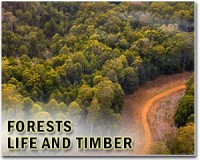| . |  |
. |
Monrovia (AFP) March 16, 2010 Liberia's rainforests, once ravaged for blood timber sold to fund one of Africa's bloodiest civil wars, are being primed as a lucrative and legal industry using cutting-edge tracking technology. One by one an electronic tag -- similar to bar codes used on consumer products -- is attached to trees in the thick woodlands covering 45 percent of the West African nation, a painstaking process that will allow consumers to trace the end-product right back to the stump. While the use of "blood diamonds" to fund wars in the region is better known, it was timber that propped up armed factions, notably those of former president Charles Taylor, during 14 years of Liberian conflict that left over 250,000 dead. Before a United Nations ban on timber exports in 2003, the timber industry brought in a quarter of Liberia's gross domestic product (GDP), and its revival is key to boosting government coffers in one of the world's poorest countries. In 2006, President Ellen Johnson Sirleaf enacted a new forestry law to protect the tropical forests which contain more than 59 species of trees --- and the UN ban was lifted. The continent's first female president cancelled all previous concessions and put Swiss monitoring company SGS in charge of managing the forests using intelligent tracking software from the Britain-based firm Helveta. "Liberia is the first country in the world where we have reached this level of the tracking system," said SGS operations manager for Liberia, Thomas de Francqueville, comparing the process to that in supermarkets. "We start the checking in the forest by making sure that only trees to be cut are cut, we follow the logs on the field, and we check the logs at the port until they are put in the ship." A report by the International Tropical Timber Organisation in 2005 showed that prior to the industry collapse, the sector generated up to 20 million dollars (14.6 million euros) a year in government revenue and 100 million dollars in exports. As the country, left in tatters by its successive civil wars, builds its economy and infrastructure from scratch, the forests could prove extremely valuable -- if they are properly managed. Illegal logging has wreaked havoc on wildlife and communities, while properly managing resources could provide sustainable income and keep the forests in good shape. "Those trees in a protected area cannot be extracted and so all of these are for conservation -- so it's obvious that the forest will always be replenished, because it's not all trees that are cut," said Eric Gayleh, SGS field officer team supervisor. Moses Wogbeh, managing director of the Liberian Forestry Development Authority FDA, said parliament had introduced a re-forestation policy and companies given licenses to operate were "very carefully" chosen. The government will have earned 12 million dollars since it started re-issuing licenses in the beginning of 2009 by the end of March, De Francqueville said. The first seven containers were exported in November, another six are currently ready for export and the first large-scale shipment is expected some time this month, according to SGS. The industry is expected to eventually employ some 50,000 people in one of the world's poorest countries, where per capita GDP is estimated at 190 dollars. However illegal felling continues, for sale on the local market, for charcoal production or to clear land for agriculture, and many of the so-called pit sawers -- the term for small-scale generally illegal loggers -- are former fighters whom authorities hope to bring over to their side. "The chainsaw will eventually fade away gradually. If some of them remain it will be a smaller scale where we will be able to manage them and control them ... but we are not taking them out of business," said Wogbeh. Key to the logging deals is ensuring that local communities benefit. So far, "we have licensed seven foreign management contracts, ranging from 50,000 to 400,000 hectares (123,500 to 988,400 acres)," Wogbeh told AFP. "In the forest management contract there are provisions spelling out that the companies have to build schools, roads, hospitals in areas where they are operating," he said. Another provision requires the company to sign a social agreement that entitles the community to 30 percent of the land rental and 1.5 dollars per cubic meter (35 cubic feet) of timber harvested, Wogbeh said.
Share This Article With Planet Earth
Related Links Forestry News - Global and Local News, Science and Application
 Climate: Progress seen on forest scheme, Germany to join
Climate: Progress seen on forest scheme, Germany to joinParis (AFP) March 11, 2010 Around 60 countries pushed ahead on Thursday with a multi-billion-dollar scheme to reduce climate-changing emissions from deforestation, to which Germany added its support, British minister Joan Ruddock said on Thursday. "There was a tremendous mood of determination to get things done. I regard this as quite a breakthrough, actually," Ruddock, who is secretary of state for energy and climate ... read more |
|
| The content herein, unless otherwise known to be public domain, are Copyright 1995-2010 - SpaceDaily. AFP and UPI Wire Stories are copyright Agence France-Presse and United Press International. ESA Portal Reports are copyright European Space Agency. All NASA sourced material is public domain. Additional copyrights may apply in whole or part to other bona fide parties. Advertising does not imply endorsement,agreement or approval of any opinions, statements or information provided by SpaceDaily on any Web page published or hosted by SpaceDaily. Privacy Statement |